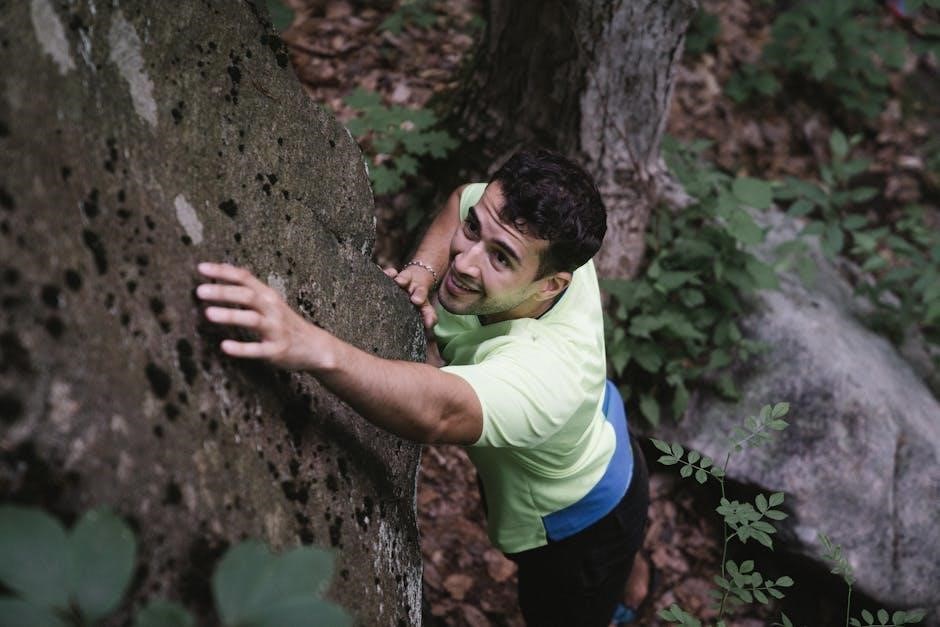The 30-Day Gratitude Challenge is a purposeful guide to cultivating gratitude, helping individuals focus on life’s positives, and fostering mental well-being through consistent practice.
Overview of the Challenge
The 30-Day Gratitude Challenge is a structured program designed to help individuals nurture gratitude through daily reflection and intentional practices. Over 30 days, participants engage in prompts and activities that encourage mindfulness, appreciation, and positive habit formation. The challenge is simple yet impactful, requiring a few minutes each day to focus on what brings joy and fulfillment. By committing to this practice, individuals can cultivate a deeper sense of gratitude, leading to improved mental well-being and a more optimistic outlook on life.
Importance of Practicing Gratitude
Practicing gratitude is a powerful tool for enhancing mental and emotional well-being. It fosters positivity, strengthens relationships, and helps individuals appreciate life’s small joys. Regular gratitude practice has been linked to reduced stress, improved sleep, and increased happiness. By focusing on what we already have, gratitude shifts our mindset from scarcity to abundance, promoting resilience and contentment. Incorporating gratitude into daily life can lead to meaningful, long-term benefits for both personal growth and overall life satisfaction.

How to Get Started with the Challenge
Begin by committing to the challenge with dedication and an open heart. Start by defining your intentions, then establish a simple yet consistent routine using tools like journals or apps to track progress and reflections daily, ensuring a meaningful and transformative experience over the next 30 days.
Setting Intentions for the Next 30 Days
Setting clear intentions is the foundation of the 30-Day Gratitude Challenge. Start by defining your purpose, whether it’s to improve mental well-being, enhance relationships, or cultivate a positive mindset. Commit to dedicating a few minutes daily to reflect on gratitude. Write down your intentions to create focus and accountability. This simple act will guide your journey, helping you stay motivated and mindful throughout the challenge. By setting intentions, you lay the groundwork for a transformative experience that fosters growth and appreciation.
Creating a Gratitude Practice Routine
Establishing a consistent gratitude routine is essential for the 30-Day Challenge; Choose a specific time each day, such as first thing in the morning or before bed, to dedicate to gratitude. Whether it’s journaling, meditating, or simply reflecting, consistency is key. Start small by identifying at least one thing you’re grateful for each day. Over time, expand your practice to include more moments or people. A well-structured routine ensures that gratitude becomes a habit, fostering positivity and mindfulness throughout your life.

Daily Gratitude Prompts for 30 Days
This section provides daily prompts to guide your gratitude journey. From expressing thanks to loved ones on Day 1 to reflecting on progress by Day 30, these prompts help you stay focused and inspired throughout the challenge.
Day 1: Express Gratitude to an Important Person
Start your journey by expressing gratitude to someone who has made a significant impact in your life. Write a heartfelt note or share your appreciation verbally, detailing how they’ve helped or inspired you. This could be a family member, friend, or colleague. Reflect on specific qualities or moments that make you thankful for their presence. This practice fosters meaningful connections and sets a positive tone for the challenge ahead. It’s a simple yet powerful way to cultivate gratitude and strengthen relationships.
Day 7: Spend 15 Minutes Practicing Gratitude
Set aside 15 minutes today to deeply reflect on the things you’re grateful for. This dedicated time allows for a more immersive gratitude practice. You might journal about meaningful experiences, meditate on positive memories, or simply sit in silence, acknowledging the blessings in your life. This extended practice helps cultivate mindfulness and intensifies the emotional impact of gratitude; Use this time to explore how gratitude has influenced your life and how it can continue to shape your mindset moving forward.
Day 30: Reflect on the Journey of Gratitude
Today marks the completion of your 30-day gratitude journey. Take time to reflect on how this practice has shaped your mindset and life. Celebrate the progress you’ve made and the positive changes you’ve experienced. Review your gratitude journal or tracker to see how your focus on thankfulness has evolved. Acknowledge the challenges and the moments where gratitude felt effortless. This reflection will help you appreciate the growth and reinforce the habit of gratitude in your daily life moving forward.

The Science Behind Gratitude and Habit Formation
Gratitude activates the brain’s reward centers, releasing dopamine and fostering positivity. Consistent practice over 30 days strengthens neural pathways, making gratitude a lasting habit.
How Gratitude Impacts Mental and Physical Health
Practicing gratitude significantly improves mental health by reducing stress, anxiety, and depression. It enhances mood, emotional well-being, and resilience. Physically, gratitude is linked to better sleep, lower blood pressure, and a stronger immune system. Regular gratitude practice fosters a positive mindset, encouraging healthier behaviors and improving overall life satisfaction. By focusing on the good in life, individuals cultivate a balanced and fulfilling lifestyle, benefiting both mind and body. This transformative impact makes gratitude a powerful tool for holistic well-being.
The Role of Consistency in Building a Gratitude Habit
Consistency is key to transforming gratitude into a lasting habit. By dedicating time daily to practice gratitude, individuals strengthen neural pathways, making it easier to notice life’s positives. Over 30 days, regular practice fosters mindfulness and shifts focus from negativity to appreciation. This consistent effort helps build resilience, reduces stress, and enhances overall well-being; Incorporating gratitude into daily routines ensures it becomes an automatic response, leading to a more joyful and fulfilling life. The 30-Day Challenge leverages this consistency to create lasting changes in mindset and behavior.

Practical Ways to Practice Gratitude Daily
Incorporate gratitude into daily life by creating a consistent routine, such as journaling, sharing appreciation with others, or reflecting on positive moments before bed.
Keeping a Gratitude Journal
Dedicate a few minutes daily to write down things you’re grateful for, no matter how small. This simple practice helps shift focus to life’s positives, fostering a mindful mindset. Use a dedicated notebook or app to track blessings over 30 days, reflecting on how each entry enriches your life. Consistency is key to building a lasting habit of gratitude, allowing you to appreciate life’s small joys and strengthen mental well-being over time.
Incorporating Gratitude into Morning or Evening Routines
Start or end your day by dedicating a few moments to gratitude. Set a specific time, such as right after waking up or before bed, to reflect on your blessings. Share gratitude with a partner, write in your journal, or simply take a minute to silently acknowledge life’s positives. Consistency in these routines helps cultivate a mindful and appreciative mindset, making gratitude a natural part of your daily life and enhancing mental well-being over time.

Tracking Progress and Staying Motivated
Use a gratitude tracker or app to monitor your daily progress, ensuring consistency. Share your journey with others to stay accountable and inspired throughout the challenge.
Using a Gratitude Tracker or App
A gratitude tracker or app is a powerful tool to monitor your progress, ensuring consistency in your practice. These tools often provide daily reminders, customizable prompts, and space to reflect on your experiences. By tracking your gratitude journey, you can visually see your growth and stay motivated. Many apps also offer inspiring quotes or tips to keep you engaged. Regularly reviewing your entries can deepen your appreciation and reinforce the habit of gratitude, making the practice more meaningful and sustainable over time.
Sharing Gratitude with Others
Sharing gratitude with others amplifies its positive impact, fostering deeper connections and spreading joy. Expressing thanks to someone directly, whether through a kind word, note, or gesture, can brighten their day and strengthen relationships. This act not only uplifts others but also reinforces your own gratitude practice. By sharing, you create a ripple effect of positivity, inspiring others to embrace gratitude as well. Small, consistent acts of appreciation can transform lives and build a supportive, compassionate community, making the world a brighter place for everyone involved.

The Connection Between Gratitude and Kindness

Gratitude inspires kindness by fostering a generous and compassionate mindset, encouraging us to appreciate others and create a positive impact in their lives daily.
Engaging in Random Acts of Kindness
Engaging in random acts of kindness enhances the 30-Day Gratitude Challenge by transforming gratitude into actionable compassion. Simple gestures, like helping a stranger or surprising a friend with a small gift, create meaningful connections. These acts not only brighten someone’s day but also foster a sense of community and belonging. Incorporating kindness into daily life strengthens the habit of gratitude, leading to improved mental well-being and a more positive outlook. By practicing kindness, participants cultivate empathy and joy, enriching their lives and others’.
How Gratitude Fuels Kindness
Gratitude naturally fosters kindness by shifting focus to the good in life, inspiring compassionate actions. When we practice gratitude, we become more aware of the kindness others show us, motivating us to reciprocate. This mindset encourages helping others, whether through small gestures or meaningful support. Gratitude cultivates empathy, making it easier to see and address the needs of those around us. By appreciating what we have, we feel more inclined to give back, creating a ripple effect of kindness that benefits both individuals and communities.

Gratitude and Self-Reflection
Gratitude and self-reflection go hand in hand, allowing individuals to appreciate their personal growth and values, fostering a deeper understanding of oneself and enhancing well-being.
Practicing Gratitude Toward Yourself
Practicing gratitude toward yourself involves acknowledging your strengths, accomplishments, and efforts. It’s about embracing self-compassion and recognizing the unique qualities that make you who you are. By appreciating yourself, you foster self-esteem, resilience, and a positive self-image. This practice helps you celebrate small victories, like completing a task or overcoming a challenge, and cultivates a mindset of kindness and acceptance; Gratitude toward yourself is a powerful form of self-care that promotes mental well-being and encourages personal growth, helping you embrace your worth and potential fully.
Learning to Appreciate Life’s Small Moments
Appreciating life’s small moments is a cornerstone of gratitude practice. It involves paying attention to everyday joys, like a good cup of coffee, a beautiful sunset, or a kind gesture from a stranger. These moments, though often overlooked, contribute significantly to our well-being. By focusing on them, we cultivate a mindset of contentment and joy. Reflecting on these small pleasures daily helps us recognize life’s abundance and fosters a deeper connection to the world around us, making gratitude a natural part of our daily lives.
Completing the 30-Day Gratitude Challenge marks a meaningful shift in mindset, fostering a lasting habit of appreciation. Continue nurturing gratitude daily to sustain its transformative power.
Continuing the Gratitude Practice Beyond 30 Days
After completing the 30-Day Gratitude Challenge, it’s essential to integrate gratitude into your daily life. Consistency is key to sustaining its benefits. Incorporate gratitude into your morning or evening routines, such as journaling or sharing appreciation with others. Over time, this practice becomes a natural habit, fostering a positive mindset and resilience. Explore new ways to express gratitude, like through creative activities or community involvement. By continuing this journey, you’ll deepen your ability to find joy and contentment in life’s everyday moments, creating a lasting impact on your well-being.
Resources for Further Learning
For those eager to deepen their gratitude practice, numerous resources are available. Downloadable PDF guides, such as the 30-Day Gratitude Challenge, offer structured plans and prompts. Gratitude workbooks and journals provide space for reflection, while mobile apps like Gratitude365 or Happify offer daily reminders and exercises. Online courses and blogs explore the science behind gratitude, offering tips for sustaining the habit. Additionally, joining community groups or forums dedicated to gratitude can provide inspiration and support, helping you continue your journey beyond the initial challenge.
